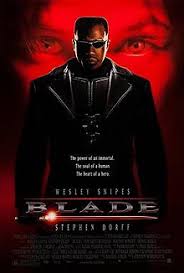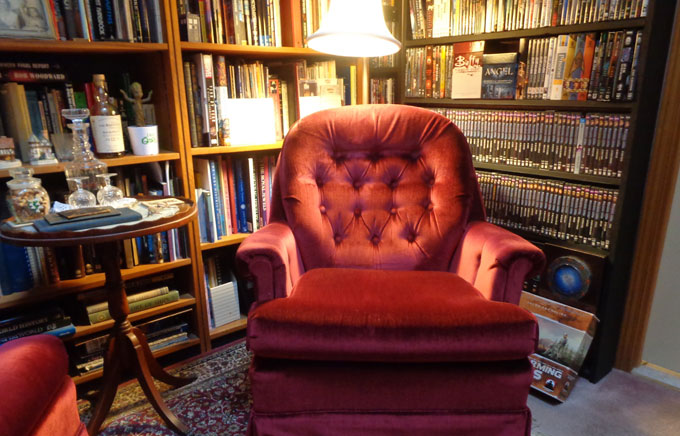
Black Panther was not the first black superhero in the Marvel Cinema Universe--that was Blade in 1998. Reportedly, Wesley Snipes really wanted to play Black Panther, but New Line Cinema was not interested. My guess is that they thought there was no money to be made in the Kingdom of Wakanda, but vampires were big that decade--Interview With a Vampire had just made a ton of money.
In July, 1973, in Marvel's Tomb of Dracula #10, Marv Wolfman (!) and Gene Colon created Blade, a black Slayer who killed vampires with wooden blades. When Eric Brock's mother was in labor, she was bitten by the vampire Deacon Frost, who was posing as a doctor, just as she was giving birth. Her son was born with immunity to a vampire's bite and a hatred for all the undead. He was possessed of a vampire's strengths but the ability to walk in daylight, which is why he was also called The Daywalker. (That same year of 1973, incidentally, Black Panther, who had been around since his appearance in Fantastic Four #52 in 1966, starred in his own comic book.)
The film opens in the year 1967 as Blade's mother is giving birth on her deathbed, then switches to the present time at a vampire rave in a slaughterhouse, in which blood pours from the sprinkler system and the unfortunate guests are becoming the main course. Festivities are interrupted by Blade, seriously overdressed in a floor-length black leather coat, with a Samurai sword and various other lethal accoutrements.
One of the crispy critters he leaves behind is brought to the hospital and seen by an attractive medical examiner--Dr. Karen Jenson, played by N'Bushe White, who is surprised to find the corpse awakening and biting her. Blade shows up to finish the job of dusting the creature and, clearly against his better judgement, takes her to his secret headquarters, where his cynical, terminally ill partner Abraham Whistler, played by Kris Kristofferson, tries to cure her with garlic and silver nitrate injections. Who knew?
Meanwhile, we learn that the governing Vampire Council, who run most of the world, are not happy with Blade. Deacon Frost, Blade's creator, played by Stephen Dorff, is particularly angry, but he has plans of his own to take power from the ruling Council which require Blade's unwilling assistance. As the blood-soaked story develops, we learn a great deal: vampire mace is made of silver and garlic, vampires have legions of human familiars--vampire wannabes--who do their bidding, especially in the daytime, and everyone is awaiting the fulfillment of a prophecy about the Awakening of the Blood God, which provides the backdrop for the movie's long and bloody climax.
What I like most about vampires is the lore--centuries of undead political machinations and Royal intrigue, slayer weapons using such things as silver, garlic, ultraviolet light, etc. (Not holy water in this movie--the director said, "What about Jewish vampires? That's crazy.") Werewolves have only a barbarous tribal lore, and zombies have no lore at all, unless you count "Brains!" There is plenty of lore in Blade, plenty of blood and lethal choreography. Wesley Snipes makes a compelling dark hero, with the leather armor, dark glasses, trick weapons, the balletic moves, the black Dodge Charger with the tinted windows, and the scowling visage. The story is somewhat simple, though the flight through the subway is exciting and the climax is huge, if a little confusing. The Blade comic book was one of the factors in the demise of the restrictive Comics Code, and makes a pretty good start to Marvel taking over the superhero movie industry.
